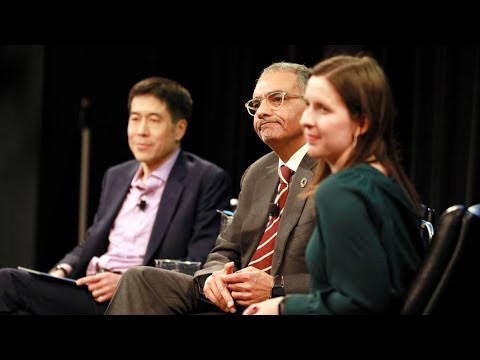Asia Society
SAN FRANCISCO, January 15, 2020 — Speakers include Chairman of Chehadé and Company Fadi Chehadé and Director of Frontier Technology Research at Asia Society Northern California Heather Evans discuss the evolution of artificial intelligence and what winning the AI “arms race” would mean for the U.S. and China. The conversation was moderated by Partner of McKinsey Global Institute Michael Chui. (57 min., 38 sec.)
Source
The Future of the U.S. and China: Artificial Intelligence and Technology Diplomacy




"Artificial Intelligence" – that term, or phrase, is not as clear as you might think. On the one hand, there is the aspect of computational speed and access to a broad range of data and the capacity to sort through complex data sets and arrive at a solution. Which is basically a function of electronically crunching data. And then, on the other hand, there is the broader dimension of "intelligence," which, in humans, requires a componet of emotion and feeling. Neuroscience confirms this, telling us that human intelligence or human rationality is not only sifting through data, but also including or involving likes and dislikes, desires and fears, hunger and satiety, pleasure and pain, and so on. So, back to "Artificial Intelligence," there will never truly be non-human intelligence, artificially created (e.g., in a laboratory or on an assembly line), until, for example, the computer also has a biological component for the addition of feeligs: of likes and desires, of loves and hates, pain and pleasure, hunger and satirty, and so on. If a human, for example, experiences a brain injury such that he or she is still rational, but loses the emotional feeling, then he or she is unable to choose which restaurant to go to for a meal. Instead, he or she will compare attributes and lists and so on for pretty much forever, but without feelings, or likes and dislikes, wants and desires, loves and fears, etc., there can be no choice made. Now, in a computer, a "choice" might be programmed into its algorithmic process and hence the computer can generate an answer, but what the computer is doing is not intelligence, real or artificial. Only when the computer has the capacity for feelings, for the emotional component, will it then truly be said to be "artificial intelligence." Without the biological or emotional component, the computer is just a fast or slow data cruncher, which might perhaps be "smarter" than slower or less powerful computers, or even a human in terms of speed, but it is not "intelligent."
Weaponisation of technology brings out the worst in both the USA & China. I'm afraid folks in this field of tech diplomacy, like Fadi & Heather will have really tough times ahead, treading through geo-political minefields of these 2 tech behemoths.
Can't stress enough the importance of this frontier that Fadi & Heather are engaged in, world peace literally depends on the outcome of their work.
Great video, thoroughly enjoyed it and so thought provoking…..
"Weaponisation of technology" has been done since there were humans. After the advent of nuclear weapons, nothing man made can be worse. So using AI in weapons is a none issue. In fact AI has been widely used in weapons already.
Regarding that first Q in the Q&A from Ali Payments about American perception of the relationship between Chinese tech companies and the Chinese government… IMO American society can be divided between the "more globally sophisticated" and the "rural rubes" which today correspond roughly with "Red vs Blue." Those who are in any kind of tech are generally aware of the globalization of technical knowledge, open source, and the principles of co-operation between different peoples to advance the welfare of both and all. But, nearly half (or at least a hard core 1/3) of the American population don't understand win/win and think that somehow they alone can advance faster than everyone else on their own, and nothing can sway them from that because it's based on on their personal experience. The Trump Administration's isolationism is only a message to an already receptive audience.
Unsaid though is the critical requirement that all Chinese companies must ultimately provide the government anything the government asks, that is a hard line deal breaker for the rest of the world no matter how any Chinese company might feel it operates independently of the government.